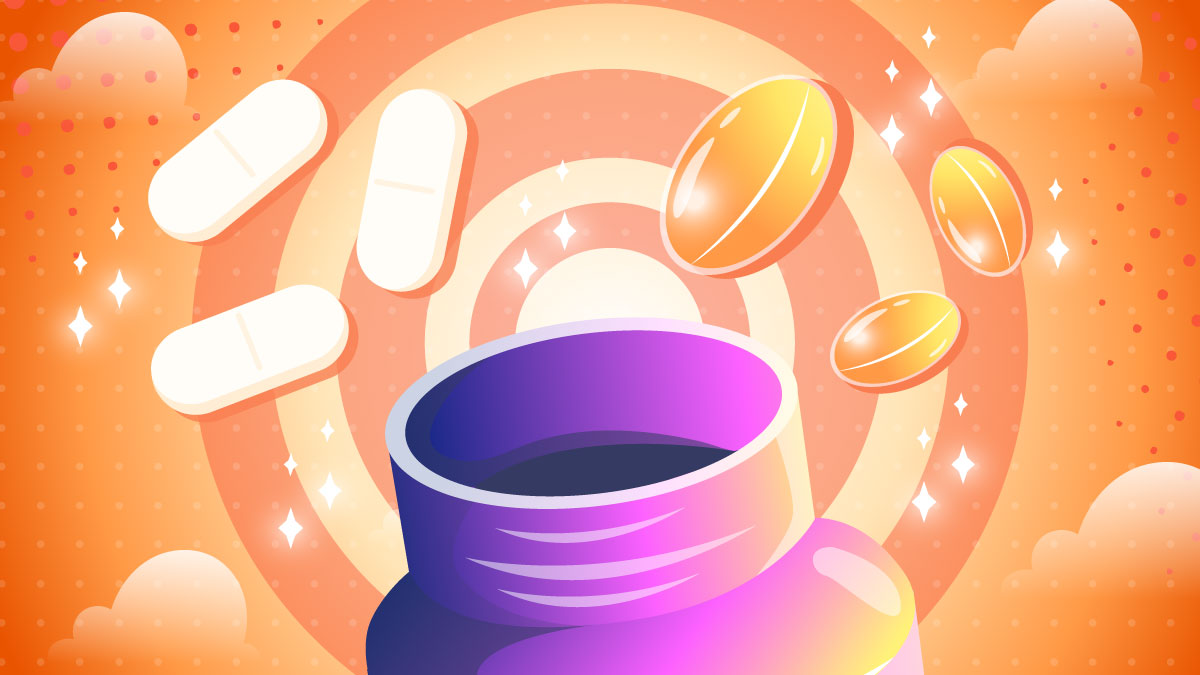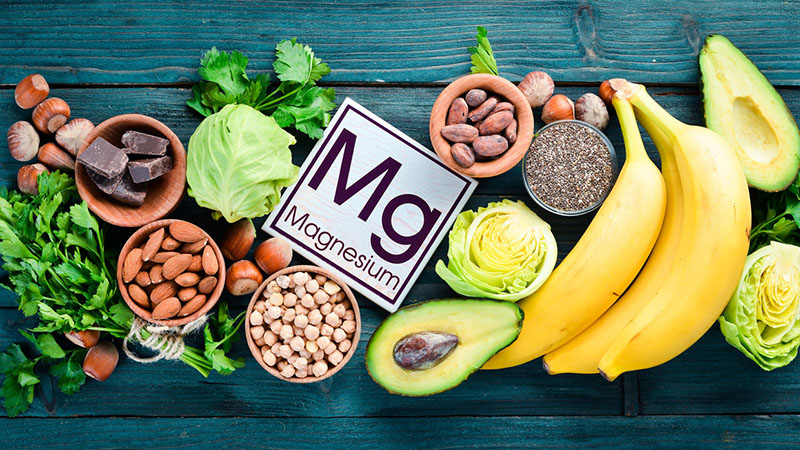Can I Take CBD and Magnesium Together?

CBD, short for cannabidiol, is used as an adjunctive treatment for a variety of health problems, including pain and inflammation. It has a very good safety profile in most illnesses.
Magnesium is an essential mineral that can be beneficial for treating migraines, hypertension, bone density loss, and more.
Since both compounds use different mechanisms of action, there’s very little chance that negative interactions will occur.
As of today, there are no reports with complaints about taking CBD and magnesium together.
In this article, we provide a general breakdown of the dos and don’ts of CBD and magnesium supplementation.
Does CBD Interact with Magnesium?
No, there’s no evidence supporting any kind of interactions caused by taking CBD and magnesium together.
Certain conditions call for a higher intake of magnesium for only a short period, so the chances of interactions between the two substances reaching toxic levels in the blood are extremely low.
However, if you want to take CBD and magnesium in tandem, you should still do it with caution. Magnesium may impact the absorption of CBD in the digestive system, thus compromising its efficacy.
To avoid this potential side effect, it’s best to take magnesium supplements around 2 hours apart from your CBD oil.
Can CBD be a Good Alternative to Magnesium?
I wouldn’t consider it in that manner because CBD and magnesium are completely different supplements.
Magnesium is a crucial mineral used in more than 300 enzymatic processes in our bodies. CBD is a cannabinoid extracted from hemp and interacts with the human endocannabinoid system (ECS) — our major regulatory network that promotes and helps maintain homeostasis.
For most applications, you can’t use CBD instead of magnesium. You can however use CBD for certain medical conditions that magnesium is also recommended for.
If you suffer from a magnesium deficiency, CBD won’t solve the problem, but if the root cause of your health problems is somewhere else, CBD may significantly assist you in treating these conditions more than magnesium supplements.
Given this, it’s better to include both supplements in your daily routine to achieve a more holistic effect than if you took either one individually.
Just make sure not to take them at the same time — this is to enable maximum absorption of both compounds.
You can take CBD and magnesium to ease the following health conditions:
CBD vs Magnesium for Migraine Headaches
Magnesium is the go-to supplement for treating migraine headaches. Many people with migraines have low levels of magnesium, so adding this supplement can lower your migraine headaches.
CBD has also been highlighted as an effective treatment for migraines and other forms of headaches, including cluster headaches and hangovers.
While it’s unlikely that CBD alone will prevent or erase your migraines, it may reduce the duration and severity of these attacks — not to mention concomitant problems like insomnia, nausea, vomiting, and sleep disturbances.
CBD vs Magnesium for Depression & Anxiety
Again, patients with depression usually have low magnesium scores on their tests, so supplementing it can alleviate the symptoms and help enhance mood in depressive patients.
CBD acts on the 5-HT1A neuro-receptors in the brain, which helps the body use serotonin more efficiently and thus produce an anxiolytic and antidepressant effect.
CBD vs Magnesium for Cardiovascular Diseases

Magnesium has been proven to decrease the risk of getting a stroke, ischemic and coronary heart disease, metabolic disorders, and hypertension.
In one study, CBD demonstrated remarkable antioxidative properties, translating into better cardiac function. Its anti-inflammatory effects also help reduce the risk of cardiac diseases.
CBD vs Magnesium for Insomnia
Magnesium can regulate the neurotransmitters directly related to the brain, hence the potential in treating insomnia.
CBD may also improve sleep on top of helping regulate the sleep-wake cycle and is more tolerated than conventional sleeping pills.
CBD vs Magnesium for Type 2 Diabetes
If you want to ensure the proper breakdown of glucose in the body, you need to control your magnesium levels. Having a good amount of magnesium in the diet may help prevent type 2 diabetes.
CBD can offer metabolic support as well. These properties stem from the cannabinoid’s interaction with the ECS. The ECS is strongly related to liver and pancreas health — both of which are mentioned in the pathophysiology of diabetes.
CBD vs Magnesium for Bone Health
When your body lacks magnesium, it can further create problems with bone health, namely osteoporosis in the body. To prevent this condition, dieticians recommend supplementing with magnesium. It’s one of the most popular supplements for menopausal women for this reason.
Again, with CBD, it’s the interaction with the endocannabinoid system that improves bone health by increasing bone density and reducing inflammation in the body.
CBD vs Magnesium for Epilepsy
Seizures caused by conditions related to pregnancy like eclampsia can be treated with magnesium sulfate, a compound containing magnesium. It’s a common supplement in magnesium-deficient people.
CBD-based medications, such as Epidiolex and Satives, are approved to treat a wide range of seizure disorders thanks to their anticonvulsant and antispasmodic properties.
What is Magnesium?

Magnesium is among the essential macrominerals that we need to survive and thrive in good health. It can be obtained from different kinds of foods, supplements, and even medications.
The most common indication for taking magnesium supplements is magnesium deficiency, but it can also be prescribed for problems like constipation, arrhythmias, heartburn, pre-eclampsia, eclampsia, and more.
Magnesium engages in more than 300 unique enzymatic reactions within the body. They range from liver metabolism to cellular replication and hundreds of different processes in between.
Your muscles and nerves, blood pressure, immune function, bone health — these are just some of the essential functions that magnesium can help control.
Magnesium Highlights
| Names | Magnesium, magnesium carbonate, magnesium citrate, magnesium chloride, magnesium malate, magnesium sulfate, magnesium oxide |
| Classification | Essential Macromineral |
| Metabolism | Kidneys, digestive system |
| Interaction with CBD | Very unlikely |
| Risk of Interaction | Low |
What Does Magnesium Do for the Body
The body needs magnesium to properly manage several physiological functions.
It’s distributed to the soft tissue, skeletal muscle, bones, and extracellular fluids. The regulation of magnesium levels occurs through an interaction between absorption by the bone, intestinal absorption, and renal absorption (or excretion).
Magnesium facilitates ion transport and helps maintain the balance across cellular membranes. It also controls the uptake and release of calcium, controlling its metabolism as the calcium channel competitor.
The mineral also can induce muscle relaxation and reduce spasms by stopping the contraction caused by calcium in the smooth muscles and acetylcholine’s actions on the junctions between the muscle and nerves.
Magnesium supports over 300 enzymes in triggering different processes in the body. It also contributes as a cofactor to enzymatic actions in various bodily activities — from building proteins to regulating glucose levels to building bones, controlling blood pressure, and maintaining muscles and nerves in a good condition.
Another aspect of your health that can benefit from magnesium supplementation is the actions of N-methyl-D-aspartate (NMDA) glutamate receptors, which are required for learning and memory formation.
Overactive glutamate in the brain can lead to anxiety, depression, and seizures. Magnesium can block the action of glutamate in the NMDA receptors — potentially preventing or treating depression.
Symptoms of Magnesium Deficiency
If you have a magnesium deficiency, you may experience the following symptoms:
- Muscle cramps
- Tingling
- Nausea
- Vomiting
- Headaches
- Numbness
Magnesium can be used to treat cardiac arrhythmias resulting from hypomagnesemia, seizures triggered by eclampsia, constipation, heartburn, migraines, and nephritis.
Side Effects of Magnesium
Despite a decent safety profile, too much magnesium taken for a long period — such as 350 mg daily — can cause dangerous buildups that are responsible for many nasty side effects, such as:
- Stomach upset
- Nausea
- Vomiting
- Diarrhea
- Facial flushing
- Low blood pressure
- Tingling sensation
- Weakness
- Overactive reflexes
- Fatigue
- Confusion
- Slowed Breathing
- Muscle depression
- Coma
3 Drug Interactions with CBD

Several studies demonstrated that CBD is effective in treating a wide range of symptoms and diseases.
However, like most other therapeutic substances, it can interact with other medications when administered together.
These effects occur due to the chemical nature of these supplements. Therefore, taking CBD with other drugs should be carefully monitored by your doctor.
There are three mechanisms that CBD uses to interact with other drugs, including:
1. Agonistic Interaction
This type of interaction means that two compounds show the same effect in the body. When taken together, they act on the same or different receptors. However, their effects have the same directions.
Medications that can enter agonistic interactions with CBD are:
- Antihypertensive Medications – such as alpha-blockers, beta-blockers, angiotensin II receptor blockers, ACE inhibitors, calcium channel blockers, central agonists, and diuretics. CBD can interact with these drugs causing a drop in blood pressure, lightheadedness, and fainting.
- Anti-anxiety Medications – such as benzodiazepines and barbiturates. CBD could extend the duration of these medications.
- Antidiabetic Medications – such as GLP-1 receptor agonists, SGLT-2 inhibitors, DPP-4 inhibitors, meglitinides, sulfonylureas, insulin, alpha-glucosidase inhibitors, and biguanides
2. Antagonistic Interaction
This works in an opposite way to the agonistic interaction.
Antagonistic interactions occur when two drugs have opposite effects on each other. When taken together, one compound may invalidate the effects of the other, lowering its efficacy.
Examples of antagonistic CBD-drug interactions include:
- Stimulants – drugs like amphetamine and modafinil. CBD can inhibit the effects of these drugs.
- Immunomodulators – including antihistamines like carbinoxamine, levocetirizine, and desloratadine. The sedative properties of CBD could make the side effects of immunomodulators worse.
- Immunosuppressants – such as azathioprine, mycophenolate, methotrexate, cyclosporine, etc. CBD’s immuno-modulating properties may weaken the effects of immunosuppressants.
- Asthma medications – drugs like fluticasone, ipratropium bromide, montelukast, albuterol, and theophylline. CBD may mitigate the actions of these drugs and speed up their excretion from the body.
3. Metabolic Inhibition
Some meds require similar enzymes to metabolize the drug molecules. It results in competition between both drugs; they act against each other and cause a slowdown in the metabolic rate of both drugs.
Medications prone to metabolic inhibition when taken with CBD include:
- Blood Thinners – CBD could increase the concentration of warfarin, enoxaparin, heparin, and other anticoagulants.
- NSAIDs – drugs like ibuprofen and naproxen interact with CBD and thus could last longer in the bloodstream.
- Opiate Painkillers – such as morphine, codeine, and hydrocodone. CBD competes with them in the liver, theoretically increasing the chance of overdose.
- Antidepressants – drugs like trazodone, mirtazapine, vortioxetine, and vilazodone. CBD can inhibit their breakdown and cause the buildup of these drugs in the body.
Final Thoughts on Interactions Between CBD and Magnesium
CBD and magnesium use completely different mechanisms and, in theory, shouldn’t interact with one another.
However, there are no proper clinical trials and studies examining the potential interactions, nor do we have reported documentation of the side effects by users who have taken them in conjunction.
If you regularly use magnesium and want to add CBD to boost its benefits for a specific health disorder, you should consult it with your doctor before buying any CBD product.
However, if you take both supplements for the sole purpose of supplementation, there’s little to no risk of using CBD and magnesium together.
Just make sure to leave a 1- or 2-hour window between each dose; otherwise, magnesium may negatively impact the absorption rate of CBD in the digestive system.
If you experience any adverse reactions after taking CBD and magnesium, stop using them and wait for a few days to see if the symptoms are gone. If they persist, visit your doctors to figure out the potential cause.
Sources:
- Yablon, L. A., & Mauskop, A. (2011). Magnesium in headache. Magnesium in the Central Nervous System. Adelaide (AU).
- Leimuranta, P., Khiroug, L., & Giniatullin, R. (2018). The emerging role of (endo) cannabinoids in migraine. Frontiers in pharmacology, 9, 420. [2]
- Kirkland, A. E., Sarlo, G. L., & Holton, K. F. (2018). The role of magnesium in neurological disorders. Nutrients, 10(6), 730. [3]
- R de Mello Schier, A., P de Oliveira Ribeiro, N., S Coutinho, D., Machado, S., Arias-Carrión, O., A Crippa, J., … & C Silva, A. (2014). Antidepressant-like and anxiolytic-like effects of cannabidiol: A chemical compound of Cannabis sativa. CNS & Neurological Disorders-Drug Targets (Formerly Current Drug Targets-CNS & Neurological Disorders), 13(6), 953-960.
- Rosique-Esteban, N., Guasch-Ferré, M., Hernández-Alonso, P., & Salas-Salvadó, J. (2018). Dietary magnesium and cardiovascular disease: a review with emphasis in epidemiological studies. Nutrients, 10(2), 168. [5]
- Rajesh, M., Mukhopadhyay, P., Bátkai, S., Patel, V., Saito, K., Matsumoto, S., … & Pacher, P. (2010). Cannabidiol attenuates cardiac dysfunction, oxidative stress, fibrosis, and inflammatory and cell death signaling pathways in diabetic cardiomyopathy. Journal of the American College of Cardiology, 56(25), 2115-2125.
- Abbasi, B., Kimiagar, M., Sadeghniiat, K., Shirazi, M. M., Hedayati, M., & Rashidkhani, B. (2012). The effect of magnesium supplementation on primary insomnia in elderly: A double-blind placebo-controlled clinical trial. Journal of research in medical sciences: the official journal of Isfahan University of Medical Sciences, 17(12), 1161.
- Shannon, S., Lewis, N., Lee, H., & Hughes, S. (2019). Cannabidiol in anxiety and sleep: a large case series. The Permanente Journal, 23. [8]
- Barbagallo, M., & Dominguez, L. J. (2015). Magnesium and type 2 diabetes. World journal of diabetes, 6(10), 1152.
- Jadoon, K. A., Ratcliffe, S. H., Barrett, D. A., Thomas, E. L., Stott, C., Bell, J. D., … & Tan, G. D. (2016). Efficacy and safety of cannabidiol and tetrahydrocannabivarin on glycemic and lipid parameters in patients with type 2 diabetes: a randomized, double-blind, placebo-controlled, parallel-group pilot study. Diabetes Care, 39(10), 1777-1786.
- Castiglioni, S., Cazzaniga, A., Albisetti, W., & Maier, J. A. (2013). Magnesium and osteoporosis: current state of knowledge and future research directions. Nutrients, 5(8), 3022-3033.
- Kogan, N. M., Melamed, E., Wasserman, E., Raphael, B., Breuer, A., Stok, K. S., … & Bab, I. (2015). Cannabidiol, a major non‐psychotropic cannabis constituent enhances fracture healing and stimulates lysyl hydroxylase activity in osteoblasts. Journal of Bone and Mineral Research, 30(10), 1905-1913.
- Anthony, J., Johanson, R. B., & Duley, L. (1996). Role of magnesium sulfate in seizure prevention in patients with eclampsia and pre-eclampsia. Drug safety, 15(3), 188-199.
- Silvestro, S., Mammana, S., Cavalli, E., Bramanti, P., & Mazzon, E. (2019). Use of cannabidiol in the treatment of epilepsy: efficacy and security in clinical trials. Molecules, 24(8), 1459. [14]